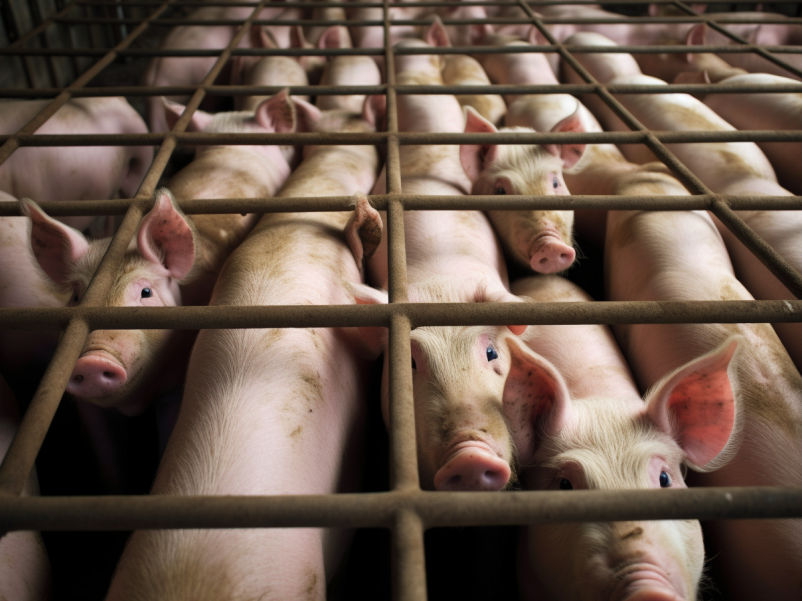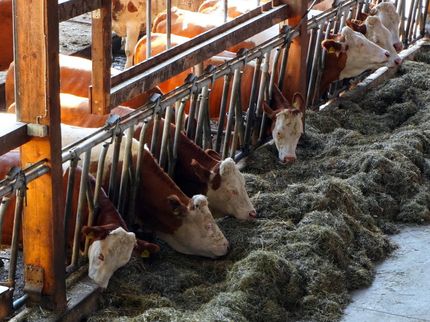World Animal Protection names JBS Foods worst offender in new scorecard ranking meat industry's climate impact
JBS Foods, the giant global meat producer, ranks highest in Greenhouse Gas emissions in World Animal Protection's new Factory Farming Climate Culprits Scorecard.

Computer generated picture
Released today, the scorecard ranks the world's top five factory farming giants based on the total emissions released from their chicken and pig production, which combined slaughter 11.5 billion chickens and 150 million pigs every year. Factory farming is an often-overlooked climate culprit, with the world's five biggest factory farming companies responsible for emissions equivalent to 36.4 million cars on the road annually.
The production of factory-farmed chickens and pork by JBS alone causes emissions equivalent to 14 million gas-powered vehicles on the road each year – more than all the cars in New York City. In 2023, the National Advertising Division of the US Better Business Bureau concluded that JBS should discontinue its claims of achieving "net zero" carbon emissions by 2040 because there was no indication that the company is currently implementing any plans to achieve net zero.
JBS has been linked to multiple instances of illegal deforestation in Brazil, destroying wildlife habitats and ecosystems to source corn and soy for animal feed. The company's current policy allows illegal deforestation of the Amazon region until 2025 and legal deforestation globally for a further ten years.
Annette Manusevich, Farming Campaign Manager, World Animal Protection, US, states, "This scorecard highlights the immense impact a handful of factory-farmed meat producers have on the climate. Companies like JBS are some of the largest contributors to the climate crisis, yet they are rarely held accountable. Animals are suffering extreme cruelty in factory farms, and our environment cannot sustain the unchecked expansion of mega meat producers. This scorecard adds to the mounting evidence that factory farming is not compatible with a climate-safe future."
Lindsay Oliver, Executive Director, World Animal Protection US, states, "JBS is responsible for unspeakable cruelty and the slaughter of billions of thinking, feeling animals each year and is the worst contributor of factory farming greenhouse gas emissions. This scorecard further exemplifies the corruption on which JBS is built and the exploitation of both animals and humans on which it profits."
The scorecard builds on data from World Animal Protection's Climate Change and Cruelty report, which captured the environmental and climate change impacts of farming chickens and pigs in the world's four biggest factory farming hot spots - Brazil, China, the USA, and the Netherlands.
World Animal Protection is calling on companies, particularly JBS, to halt the expansion of factory farming operations, especially those threatening and destroying habitats to grow animal feed. The need to stop the expansion and development of new factory farms cannot be understated. Beyond threatening our climate, factory farms force animals into cramped, confined, and barren conditions. This is cruelty at its worst, and it must end.
Consumers and companies can make a lasting impact by adopting more plant-based options and supporting emerging sustainable proteins, such as cultivated meat. By eliminating or reducing the demand for animal products, we can decrease the environmental destruction caused by factory farming.
All animals deserve a life where they are treated with kindness and respect. The Farm System Reform Act (FSRA), reintroduced this year by Senator Cory Booker (D-NJ), would phase out the largest factory farms in the US by 2040, helping to save millions of farmed animals from suffering and prevent millions of tons of greenhouse gas emissions.




























































